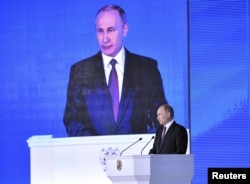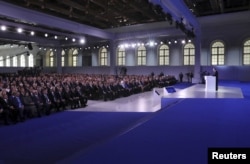On one level it was the kind of speech an incumbent leader seeking reelection would give, offering material improvements, making economic promises, and pledging to create more jobs and build better houses.
Delivering his annual state of the nation address Thursday, his 14th and the last one he will make before an election on March 18 he’s expected to win easily, Russian President Vladimir Putin said his “top priority is to preserve the people of Russia and improve their welfare,” adding that it was “unacceptable” that 20 million Russians are living below the official poverty line.
What grabbed international attention, however, wasn’t his pledge to spend more on maternity pay, hospitals and childcare as well as urban development and education, but his highlighting in bold language Russia’s military buildup under his leadership and his focus, especially on the country’s nuclear strength.
Putin's surprise announcement of the development of a new cruise missile that he claims can’t be intercepted by the U.S. air-defense shield in Europe and Asia, and of a new, heavy payload intercontinental missile, risks upending strategic stability and triggering a new arms race, according to former Swedish prime minister Carl Bildt.
“If there was wisdom in the world there would now be a new phase of strategic stability talks between the U.S. and Russia followed by concrete agreements,” tweeted a clearly worried Bildt.
Former U.S. ambassador to Russia Michael McFaul also argued it is time to restart arms control negotiations. "Putin’s announcement today about his new nuclear weapons aimed at us should be a wake up call to Trump,” he tweeted. He said the unveiling of the new super-weapons may not be a return to the Cold War, “but most certainly is a Hot Peace.”
‘Wake-up call’
Former U.S. ambassador to Russia Michael McFaul also argued it is time to restart arms control negotiations. "Putin’s announcement today about his new nuclear weapons aimed at us should be a wake up call to Trump,” he tweeted.
Mc Faul added the unveiling of the new super-weapons may not be a return to the Cold War, “but most certainly is a Hot Peace.”
Of the new super-weapons unveiled by Putin, the innovative cruise missile stands out as a possible game-changer. Putin described it as “low-flying, difficult-to-spot” and “with a nuclear payload with a practically unlimited range and an unpredictable flight path, which can bypass lines of interception and is invincible in the face of all existing and future systems of both missile defense and air defense.”
His showcasing of a range of new nuclear-related weapons, including a submarine-launched nuclear-armed underwater drone, was accompanied by video presentations and computer images of the new weapons speeding toward the United States. The videos were shown on large screens in the conference hall full of enthusiastic Russian lawmakers and officials.
The speech’s venue had been shifted in a clear signal that the Kremlin wanted to attract more attention. Normally, Putin delivers his annual state of the nation speech in the gilded St. George’s Hall in the Kremlin complex. This time, it was transferred to an exhibition hall in central Moscow, where video and animations of speeding missiles could be shown.
They will strike “like a meteorite, like a fireball,” Putin said dryly in his most forceful declaration yet of Russia's military might and nuclear strength. “Russia remained a nuclear power, but no one wanted to listen to us. Listen to us now," Putin said after announcing the super-weapons.
‘Moment of truth’
"Giving half the time in the annual address to the Russian parliament to a graphic description of new weapons’ capabilities is a measure of how close the U.S. and Russia have moved toward military collision,” tweeted Dmitri Trenin, director of the Carnegie Moscow Center, a think tank.
As the speech unfolded, former Putin adviser Gleb Pavlovsky said, “The old man only brightened up when talking about how he can destroy the whole world. A moment of truth!”
Why Putin decided to announce a new arms race now has left analysts divided.
Some say it has to be seen as part of the Russian leader’s electioneering.
While he remains highly popular, according to opinion polls, the Kremlin is worried about voter turnout, and opposition activists say Putin’s aides are worried as they try to balance between keeping tight control over campaigning and avoiding voter apathy. The Kremlin, they say, is determined to ensure a big turnout to demonstrate that Putin remains Russia’s "irreplaceable leader" 18 years after first coming to power, and that his grip on the nation hasn’t weakened.
The country’s only truly independent opposition leader, anti-corruption campaigner Alexei Navalny, has been excluded from running. He is urging supporters to boycott the polls to try to depress the vote.
‘You have failed to contain Russia’
In a bid to boost his popularity, Putin has presented himself before as the kind of decisive leader Russia needs to protect itself. He outlined again on Thursday the narrative of a Russia under siege. “I want to tell all those who have fueled the arms race over the last 15 years, sought to win unilateral advantages over Russia, introduced unlawful sanctions aimed to contain our country's development: all what you wanted to impede with your policies has already happened,” Putin said. “You have failed to contain Russia.”
The nuclear-missile developments Putin has been pushing pre-date this election. They began more than a decade ago, after Putin complained bitterly about the U.S. withdrawal from the Anti-Ballistic Missile Treaty in 2002 and its deployment of missile defense installations in Romania and Poland.
The Kremlin has long feared that defensive systems capable of intercepting Russian missiles would open the way for Western enemies to launch a first strike against Russia.
The roots of this fear go back to the early 1980s, when Soviet intelligence agencies were convinced that the U.S. was preparing to launch a surprise nuclear attack against what was then the Soviet Union and its allies. The war scare was revealed subsequently by high-ranking Soviet intelligence defector Oleg Gordievsky, who in a later book described his intelligence bosses as being in the grip of paranoia. He said it reflected genuine fears by Soviet leaders, who misread then U.S. president Ronald Reagan’s tough rhetoric against the USSR as a prelude to war.
The Soviet intelligence agency, the KGB, launched Operation RYAN, and ordered overseas agents and assets to scoop up any information they could and act as a collective early warning system of a possible U.S.-launched first strike. This even involved deploying spotters at night to park near the Pentagon to see if more office lights were switched on than usual.
Much of Operation RYAN’s early warning focus was on Germany, where KGB agents in the Communist half of the country were under pressure to find evidence of America’s malign intention to attack.
Among those officers was a young Vladimir Putin.
Bagikan Berita Ini
















0 Response to "New Arms Race? Putin Boasts of High-Tech Weaponry"
Post a Comment